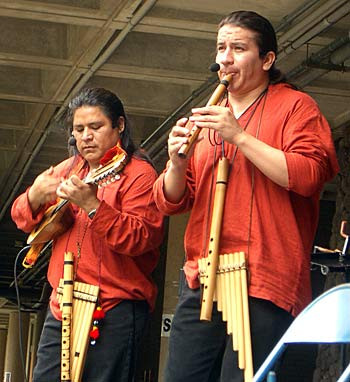
Duchicela
In Puruhua, the nearly forgotten language of pre-Incan Ecuador, Duchicela means “the mountain lion who led the people to their homeland”. Duchicela was founded in 1980 in Cacha, Ecuador and incorporated as a cultural organization to preserve and promote the music of the Andes Mountain region of South America. The group’s members are descendents of the indigenous peoples who have inhabited the area since pre-historic times. In 1990, the Smithsonian Institute invited Duchicela to their Festival of Struggle in Washington DC. Since that time, the group has toured throughout the United States participating in various folk, art, and world music festivals including the 77th Celebration of the International Year of the Worlds Indigenous People in San Diego, California, the Cultural Concert of Indigenous and Andean Music in Berkeley, California, and the World Vibration Concert Series in Las Vegas, Nevada. The American Federation of Musicians has recognized the group as meeting the standards of cultural uniqueness. Duchicela’s repertoire is a delightful blend of both traditional Andean folk music and popular contemporary works played on traditional Andean instruments. The flutes in particular are the instruments that give Andean music its unique sound. They include the various pan flutes that are made from bamboo or wood in an assortment of sizes and scales; the rondadores, which are similar to pan flutes but use the pentatonic scale; and the quenas, pre-Columbian end-blown flutes made of reed that are played without a mouthpiece. Of special interest are the jacha toyos, pan flutes nearly four feet in length that produce exceptionally deep notes and require players with well-developed lungs. The string instruments include the guitar, the mandolin, and the charango, a small ten-stringed instrument that, until recently, was made with the shell of an armadillo. A variety of drums, rattles, rain-sticks, and bird whistles complete the ensemble.
